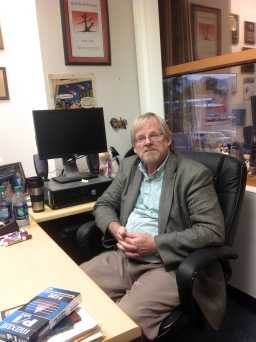By Li Han
Retiring after a 38-year career teaching at the College of Southern Nevada, English Professor Dr. Richard Logsdon pauses to consider the value of what he has accomplished and what he wants to do next.
Dr. Logsdon is retiring at the end of the spring 2013 term. Students and colleagues are reminiscing on the impact he made over the years.
Dr. Logsdon taught thousands of students including people who are now CSN professors such as Lee Barnes and Honey Duprey-Smith. He also taught students who went on to become very notable in their fields including: Chad Christensen, member of the Nevada State Assembly; Bob Beers, Las Vegas city councilman; Richard Lake, writer for the Las Vegas Review-Journal; and Maryum Ali, daughter of former-heavyweight champion Muhammad Ali.
“I like to think that I have left my mark on colleagues who, years ago, took classes from me,” Dr. Logsdon said. “Any professor’s greatest contribution should be the role he or she played in the lives of the students.”
“He’s nice and he always tries to help,” said Jihyung Kang, an international student at CSN who has taken multiple classes from Dr. Logsdon.
Michael Pawlak, a student in Dr. Logsdon’s English 102 course, said, “He is very animated and has a great sense of humor, and he also knows the material in and out.”
Not only does Dr. Logsdon have great success inside the classroom but he also has accomplished ground-breaking achievements outside the classroom.
He worked closely with a team of writers and editors to create many literary works. The team consisted of: Todd Moffett, Tina Eliopulos, and Lee Barnes. Together they created a literary magazine called “The Red Rock Review” that was very successful. In addition “The Red Rock Reader” was a textbook created for college students, and they wrote short stories about Las Vegas entitled “In the Shadow of the Strip”.
“I think my greatest accomplishment was creating the literary magazine ‘The Red Rock Review’,” Dr. Logsdon said. He was the senior editor for 16 years and retired from the position in fall of 2012.
Barnes, once a student of Dr. Logsdon and now a colleague, commented on Dr. Logsdon’s dedication and hard work on the magazine.
“The long group readings that took place among the staff sometimes got tedious. Richard— with his quirky sense of humor— kept the sessions lighthearted and productive. Mostly, I’ll miss that sense of humor,” Barnes said.
Eliopulos said, “He has a great, great mind. I’ve had the good fortune of meeting a number of incredibly intelligent individuals through my education and my teaching, but there are few minds like Dr. Logsdon’s.”
Thymios Carabas, a fellow professor and friend, said, “I only wish I had half of his energy.”
Dr. Logsdon’s accomplishments are attributed to his long-time passion for the arts.
“What really got me interested in reading were two books that my older half-brother L.J. Davis from Brooklyn sent me for Christmas: William Golding’s ‘Lord of the Flies’ and T.H. White’s ‘The Once and Future King’.I can still remember reading Golding’s book by the desk light of my downstairs’ bedroom.”
While at the University of Oregon, Dr. Logsdon found his love of literature. He credits one of his professors Don Taylor for having a profound affect on his writing and teaching style. Taylor was Dr. Logsdon’s dissertation chair. “I wrote my dissertation on 18th century English literature. I can honestly say I thoroughly enjoyed graduate school at UO.” During this time he was inspired to become an English professor.
Greatness is never achieved without battles to overcome. This was true for Dr. Logsdon. His early battle with depression was a defining period in his life.
“I can talk about it now. Most of my colleagues don’t know about it. In 1979 I was diagnosed with severe depression,” Dr. Logsdon said. This could have derailed his career but it did not. He dug in deep and focused on teaching. His accomplishments made his depression more palatable.
Beyond work, he is an avid sports fan. His love for sports stemmed back to his youth; he had dreams of playing in the Major Leagues. As an adult he created a men’s club soccer team.
Dr. Logsdon first started teaching at CSN in 1975, a few years after its inception. He has seen the growth of this college. He teaches English 101 and 102. Previously he taught Introduction to the Short Story and Introduction to Modern Literature, which were his favorites.
With the memories of a stellar career, Dr. Logsdon said that in retirement he plans to spend more time with his wife traveling. He also plans to visit his son, who is a pastor, and his daughter who lives in Indianapolis.
Even though he will be retired he admits, “I will continue to teach on a part-time basis because I will miss the teaching.”




